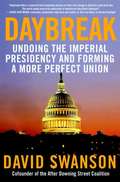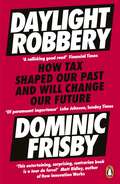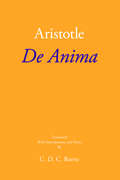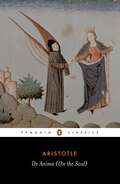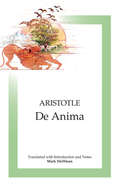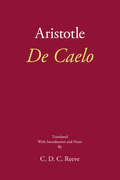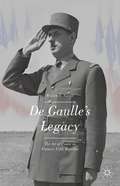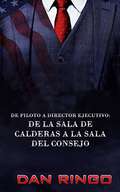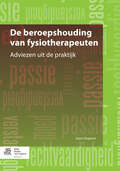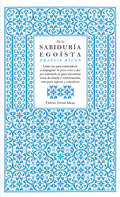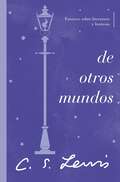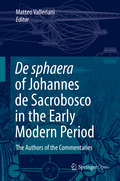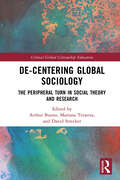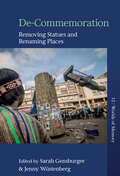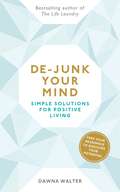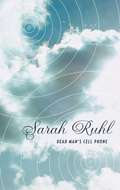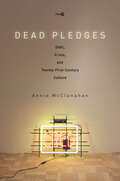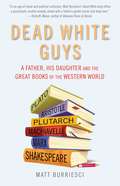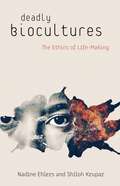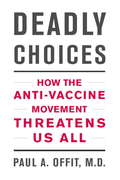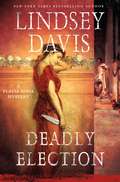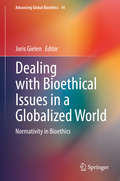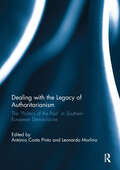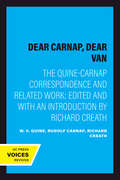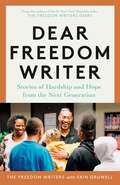- Table View
- List View
Daybreak: Undoing the Imperial Presidency and Forming a More Perfect Union
by David Swanson"[Daybreak is] a useful guide to restore the balance of powers and reclaim our constitutional system of government." -- Majorie Cohn, president of the National Lawyers Guild. "Daybreak urgently reminds us that good political intentions are not sufficient to ensure the continuation of our democracy; informed vigilance is vital to that task." -- Mark Karlin, editor of Buzzflash.com. A lot more has gone wrong over the last eight years than meets the eye, and it will take more than a new president to create the kind of change that is necessary. Daybreak is a thorough investigation of how Bush/Cheney altered the way American government works and deteriorated the Constitution and Bill of Rights. It includes clear plans for how we may reclaim democracy, declare our rights, and truly set out for a new America. Shocking and inspirational, Daybreak provides a clear breakdown of all that we have lost, and all that we have to gain. David Swanson is co-founder of AfterDowningStreet.org, creator of ConvictBushCheney.org, Washington director of Democrats.com, and a board member of Progressive Democrats for America. He served as press secretary for Dennis Kucinich's 2004 presidential campaign and has been a leading voice for the prosecution of Bush and Cheney for war crimes.
Daylight Robbery: How Tax Shaped Our Past and Will Change Our Future
by Dominic FrisbyDeath and taxes are our inevitable fate. We've been told this since the beginning of civilisation. But what if we stopped to question our antiquated system? Is it fair? And is it capable of serving the needs of our rapidly-changing, modern society? In Daylight Robbery, Dominic Frisby traces the origins of taxation, from its roots in the ancient world, through to today. He explores the role of tax in the formation of our global religions, the part tax played in wars and revolutions throughout the ages, why, at one stage, we paid tax for daylight or for growing a beard. Ranging from the despotic to the absurd, the tax laws of the past reveal so much about how we got to where we are today and what we can do to build a system fit for the future.Featured on Stepping up with Nigel Farage'An important book for investors in gold and bitcoin' - Daniela Cambone, Stansberry Research'This entertaining, surprising, contrarian book is a tour de force!' - Matt Ridley, author of The Evolution of Everything'In this spectacular gallop through history, Frisby shows how taxation has warped, stunted and thwarted human progress' - Mark Littlewood, Director General, Institute of Economic Affairs'Frisby's historical interpretation and utopian ideas will outrage Left and Right' - Steve Baker, MP for Wycombe and Member of the House of Commons Treasury Committee 'Fascinating book which exposes the political and economic basis of tax. A must read for those of us who believe in simpler, lower taxes' - Rt Hon Liz Truss, MP for South West Norfolk, Secretary of State for International Trade and President of the Board of Trade
De Anima
by Aristotle C. D. ReeveThis richly annotated, scrupulously accurate, and consistent translation of Aristotle's De Anima fits seamlessly with other volumes in the series. Sequentially numbered endnotes provide the information most needed at each juncture, while a detailed Index of Terms indicates places where focused discussion of key notions occurs. An illuminating general Introduction describes the book that lies ahead, explaining what sort of work it is and what sorts of evidence it relies on.
De Anima (On the Soul)
by AristotleFor the Pre-Socratic philosophers the soul was the source of movement and sensation, while for Plato it was the seat of being, metaphysically distinct from the body that it was forced temporarily to inhabit. Plato's student Aristotle was determined to test the truth of both these beliefs against the emerging sciences of logic and biology. His examination of the huge variety of living organisms - the enormous range of their behaviour, their powers and their perceptual sophistication - convinced him of the inadequacy both of a materialist reduction and of a Platonic sublimation of the soul. In De Anima, he sought to set out his theory of the soul as the ultimate reality of embodied form and produced both a masterpiece of philosophical insight and a psychology of perennially fascinating subtlety.
De Anima: On the Soul
by Aristotle Mark ShiffmanA complete translation of Aristotle's classic work De Anima supplemented with well-chosen notes and a comprehensive introduction. Also commonly translated as On the Soul, this work is a seminal work from the roots of Classical thinking on the nature of life and the lifeforce. Focus Philosophical Library translations are close to and are non-interpretative of the original text, with the notes and a glossary intending to provide the reader with some sense of the terms and the concepts as they were understood by Aristotle's immediate audience.
De Caelo (The New Hackett Aristotle)
by AristotleThis new translation of De Caelo (On the Heavens) fits seamlessly with other volumes in the New Hackett Aristotle series, enabling Anglophone readers to study Aristotle&’s work in a way previously not possible. The Introduction describes the book that lies ahead, explaining what it is about, what it is trying to do, how it goes about doing it, and what sort of audience it presupposes. Sequentially numbered endnotes provide the information most needed at each juncture, while a detailed Index indicates the places where focused discussion of key notions occurs.
De Gaulle’s Legacy: The Art of Power in France’s Fifth Republic
by William R. NesterThis book explores the following: What is the art of power? What is the art of French power? How did Charles de Gaulle understand and assert power, establishing the Fifth Republic and breaking centuries of political instability? How well or poorly have his successors wielded the art of French power to define, defend, or enhance French interests?
De Piloto a Director Ejecutivo: De la sala de calderas a la sala del consejo
by Dan RingoEste libro proporciona una gran visión de cómo puede superar sus obstáculos actuales y crear la vida que imaginó para usted. El autor utilizó su entorno y sus fortalezas inherentes para ascender en las filas de las empresas estadounidenses y lograr un emprendimiento exitoso. No nació en un hogar acomodado y tuvo un bajo rendimiento antes de embarcarse en su trayecto desde la sala de calderas hasta la sala del consejo.
De beroepshouding van fysiotherapeuten: Adviezen uit de praktijk
by Joost DupontHoe gaat een fysiotherapeut om met patiënten die niet willen oefenen? Wat betekent 'eerlijk zijn' voor fysiotherapeuten? Hoe reageer je op patiënten die vooral gemasseerd willen worden? Mag een fysiotherapeut vriendschap sluiten met een patiënt? Hoe gaat een fysiotherapeut om met onsympathieke patiënten en bestaan die eigenlijk wel? Wat kan een fysiotherapeut doen voor patiënten met psychosociale problemen? Wat wordt er van een stagiair verwacht en wat van een stagebegeleider? Dit boek bevat antwoorden uit interviews met circa vierhonderd fysiotherapeuten op deze en vele andere vragen over een professionele beroepshouding. Soms zijn dat tegenstrijdige antwoorden, soms verrassende. De visies van fysiotherapeuten op hun beroep zijn zo neutraal mogelijk weergegeven - de beslissing over 'wie er gelijk heeft' zullen (aankomende) fysiotherapeuten als reflectieve beroepsbeoefenaars zelf moeten maken. Op die manier groeit hun eigen visie op de beroepshouding. Dit boek is primair bedoeld om studenten fysiotherapie te stimuleren bij het ontwikkelen van een adequate beroepshouding. Het boek kan bijvoorbeeld ingezet worden tijdens bijeenkomsten rond reflectie, intervisie en ethiek. En verder tijdens de gehele opleiding wanneer een bepaald thema voor de student actueel wordt. Het boek is breed inzetbaar doordat er niet is gekozen voor een specifieke reflecteermethode of visie op ethiek. Als voorbeeld is in een aparte bijlage een benadering van professionaliteit vanuit de deugdethiek beschreven. Daarnaast komt dit boek goed van pas voor fysiotherapeuten die kennis willen nemen van adviezen van collega's bij kwesties die zich in de praktijk steeds weer voordoen. De adviezen uit het werkveld kunnen hen sterken in hun eigen keuzes of wellicht op nieuwe ideeën brengen.
De la sabiduría egoísta (Serie Great Ideas #Volumen 13)
by Francis BaconIdeas que han cambiado el mundo A lo largo de la historia, algunos libros han cambiado el mundo. Han transformado la manera en que nos vemos a nosotros mismos y a los demás. Han inspirado el debate, la discordia, la guerra y la revolución. Han iluminado, indignado, provocado y consolado. Han enriquecido vidas, y también las han destruido. Taurus publica las obras de los grandes pensadores, pioneros, radicales y visionarios cuyas ideas sacudieron la civilización y nos impulsaron a ser quienes somos. Los célebres escritos de Francis Bacon sobre temas que van desde la ira y la ambición, al matrimonio, la riqueza, la envidia, el imperio o la sabiduría, lo consagraron como uno de los padres fundadores del pensamiento científico moderno, con su rechazo de la superstición y su énfasis en las pruebas y la experimentación, la investigación y la argumentación racional. Comentarios sobre la colección Great Ideas: «De veras que la edición es primorosa y pocas veces contenido y continente pueden encontrarse mejor ensamblados y unidos. ¡Qué portadas! Para enmarcar. [...] Ante las Great Ideas, solo cabe quitarse el sombrero. ¡Chapeau!» ABC «Taurus propone un doble envite con este lanzamiento. Por un lado aumenta su compromiso con el ensayo; por otro, recupera el gusto por la estética. A los volúmenes se les ha proporcionado una portada delicada y cuidada (copian el original británico) que invita a la lectura.» La Razón «Un fenómeno editorial.» The Guardian «Aparte de los contenidos, en general muy bien elegidos, son tan bonitos que si los ven seguro que cae alguno.» El País «Ideas revolucionarias, crónicas de exploraciones, pensamientos radicales# vuelven a la vida en estas cuidadísimas ediciones, muy atractivas para nuevos lectores.» Mujer Hoy «Grandes ideas bien envueltas. De Cicerón a Darwin, esta colección entra por los ojos.» Rolling Stone «Original y bella iniciativa la emprendida por Taurus con su colección Great Ideas.» Cambio 16 «Hay libros inmortales, libros únicos que contienen pensamientos y reflexiones capaces de cambiar el mundo, tesoros en miniatura reagrupados en la colección Great ideas.» Diario de León
De otros mundos: Ensayos sobre literatura y fantasía
by C. S. LewisC. S. Lewis; el gran escritor británico, erudito, teólogo laico, locutor, apologista cristiano y autor de grandes éxitos como Mero cristianismo, Cartas del diablo a su sobrino, El gran divorcio, Las crónicas de Narnia y muchos otros clásicos; presenta la importancia de los relatos y el asombro de la imaginación, elementos a menudo ignorados por los críticos de su época. También relata sus tipos de historias favoritas; cuentos infantiles y las fantasías de la mano con una visión de sus obras más famosas: Las crónicas de Narnia y La trilogía cósmica.Of Other WorldsC. S. Lewis; the great British writer, scholar, lay theologian, broadcaster, Christian apologist, and bestselling author of Mere Christianity, The Screwtape Letters, The Great Divorce, The Chronicles of Narnia, and many other beloved classics presents a well-reasoned case for the importance of story and wonder, elements often ignored by critics of his time. He also discusses his favorite kinds of stories; children&’s stories and fantasies and offers insights into his most famous works, The Chronicles of Narnia and the Space Trilogy.
De sphaera of Johannes de Sacrobosco in the Early Modern Period: The Authors of the Commentaries
by Matteo VallerianiThis open access book explores commentaries on an influential text of pre-Copernican astronomy in Europe. It features essays that take a close look at key intellectuals and how they engaged with the main ideas of this qualitative introduction to geocentric cosmology. Johannes de Sacrobosco compiled his Tractatus de sphaera during the thirteenth century in the frame of his teaching activities at the then recently founded University of Paris. It soon became a mandatory text all over Europe. As a result, a tradition of commentaries to the text was soon established and flourished until the second half of the 17th century. Here, readers will find an informative overview of these commentaries complete with a rich context. The essays explore the educational and social backgrounds of the writers. They also detail how their careers developed after the publication of their commentaries, the institutions and patrons they were affiliated with, what their agenda was, and whether and how they actually accomplished it. The editor of this collection considers these scientific commentaries as genuine scientific works. The contributors investigate them here not only in reference to the work on which it comments but also, and especially, as independent scientific contributions that are socially, institutionally, and intellectually contextualized around their authors.
De-Centering Global Sociology: The Peripheral Turn in Social Theory and Research (Critical Global Citizenship Education)
by Arthur Bueno Mariana Teixeira David StreckerThis volume explores the challenges posed to sociological theory and social science research by a growing need to foreground perspectives stemming from, and accounting for, subaltern groups, marginal categories, the Global South, and other politically peripheral regions. De-Centering Global Sociology radically questions some of the most enduring assumptions within sociological thought and social science research and illustrates the impacts of de-centering critical concepts in public policy and education. It proposes new places to build social theory, beyond Europe and the United States, offering debates on the present and future of the social sciences. This peripheral turn also has impacts on the development of pedagogical practices, curricula, and educational research that are more inclusive, and in a position to promote global citizenship. This book will be a valuable resource for researchers and academics with an interest in global social theory, decolonial and postcolonial studies, political theory, feminism, critical race theory, economic sociology, inequality studies, urban sociology, and the sociology of work, religion, and education. It will be of particular interest to those with a focus on citizenship, social policy, conviviality, social integration and solidarity, and new perspectives on multicultural education.
De-Commemoration: Removing Statues and Renaming Places (Worlds of Memory #12)
by Sarah Gensburger and Jenny WüstenbergIn the wake of recent protests against police violence and racism, calls to dismantle problematic memorials have reverberated around the globe. This is not a new phenomenon, however, nor is it limited to the Western world. De-Commemoration focuses on the concept of de-commemoration as it relates to remembrance. Drawing on research from experts on memory dynamics across various disciplines, this extensive collection seeks to make sense of the current state of de-commemoration as it transforms contemporary societies around the world.
De-junk Your Mind: Simple Solutions for Positive Living
by Dawna WalterFree your mind, discover your potential, and become the person you want to be in 2020____________Like physical clutter in your home, mental clutter slowly fills up your head, making it hard to think and act clearly. Luckily, it's simple to de-junk your mind. By assessing your attitudes, beliefs and habits, you can easily identify the ones that are holding you back.This book will empower you with:· Exercises to gain confidence and let go of unwanted feelings · Strategies for replacing negative thought patterns with positive thinking · Communication techniques that will help you speak up and achieve your goals· Ways to keep things in perspective and look for solutions rather than problemsDe-junk Your Mind is packed with practical exercises and a big dose of tough love - it's time to take the plunge and change life for the better. Once you shed your mental clutter, you will feel lighter, more energetic and ready to seize each new day.
Dead Man's Cell Phone
by Sarah Ruhl"Satire is her oxygen. . . . In her new oddball comedy, Dead Man's Cell Phone, Sarah Ruhl is forever vital in her lyrical and biting takes on how we behave."--The Washington Post"Ruhl's zany probe of the razor-thin line between life and death delivers a fresh and humorous look at the times we live in."--Variety"Sarah Ruhl is deliriously imaginative and fearless in her choice of subject matter. She is an original."--Molly Smith, artistic director, Arena StageAn incessantly ringing cell phone in a quiet café. A stranger at the next table who has had enough. And a dead man--with a lot of loose ends. So begins Dead Man's Cell Phone, a wildly imaginative new comedy by playwright Sarah Ruhl, recipient of a MacArthur "Genius" Grant and Pulitzer Prize finalist for her play The Clean House. A work about how we memorialize the dead--and how that remembering changes us--it is the odyssey of a woman forced to confront her own assumptions about morality, redemption, and the need to connect in a technologically obsessed world.Sarah Ruhl's plays have been produced at theaters around the country, including Lincoln Center Theater, the Goodman Theatre, Arena Stage, South Coast Repertory, Yale Repertory Theatre, Berkeley Repertory Theatre, among others, and internationally. She is the recipient of the Susan Smith Blackburn Prize (for The Clean House, 2004), the Helen Merrill Emerging Playwrights Award, and the Whiting Writers' Award. The Clean House was a Pulitzer Prize finalist in 2005. She is a member of 13P and New Dramatists.
Dead Pledges: Debt, Crisis, and Twenty-First-Century Culture
by Annie McclanahanDead Pledges is the first book to explore the ways that U.S. culture--from novels and poems to photojournalism and horror movies--has responded to the collapse of the financialized consumer credit economy in 2008. Connecting debt theory to questions of cultural form, this book argues that artists, filmmakers, and writers have re-imagined what it means to owe and to own in a period when debt is what makes our economic lives possible. Encompassing both popular entertainment and avant-garde art, the post-crisis productions examined here help to map the landscape of contemporary debt: from foreclosure to credit scoring, student debt to securitized risk, microeconomic theory to anti-eviction activism. A searing critique of the ideology of debt, Dead Pledges dismantles the discourse of moral obligation so often invoked to make us repay. Debt is no longer a source of economic credibility, it contends, but is a system of dispossession that threatens the basic fabric of social life.
Dead White Guys: A Father, His Daughter and the Great Books of the Western World
by Matt BurriesciDead White Guys is a timely defense of the great books, arriving in the middle of a national debate about the fate of these books in high schools and universities around the country. Burriesci shows how the great books can enrich our lives as individuals, as citizens, and in our careers. Extending the argument first made by Anna Quinndlen's on the act of reading itself, How Reading Changed My Life," ("It is like the rubbing of two sticks together to make a fire, the act of reading, an improbable pedestrian task that leads to heat and light,) Burriesci reminds us all of the enormous impact reading has on our lives. After his daughter was born prematurely in 2010, Burriesci set out to write a book about 26 Great Books, from Plato to Karl Marx, and how their lessons have applied to his life. As someone who has spent a long and successful career advocating for great literature, Burriesci defends the great books in this series of tender and candid letters, rich in personal experience and full of humor. Matt Burriesci is a national literary leader, serving as Executive Director of both PEN/Faulkner, which bestows the largest peer-juried prize for fiction
Deadly Biocultures: The Ethics of Life-making
by Nadine Ehlers Shiloh KruparA trenchant analysis of the dark side of regulatory life-making today In their seemingly relentless pursuit of life, do contemporary U.S. &“biocultures&”—where biomedicine extends beyond the formal institutions of the clinic, hospital, and lab to everyday cultural practices—also engage in a deadly endeavor? Challenging us to question their implications, Deadly Biocultures shows that efforts to &“make live&” are accompanied by the twin operation of &“let die&”: they validate and enhance lives seen as economically viable, self-sustaining, productive, and oriented toward the future and optimism while reinforcing inequitable distributions of life based on race, class, gender, and dis/ability. Affirming life can obscure death, create deadly conditions, and even kill.Deadly Biocultures examines the affirmation to hope, target, thrive, secure, and green in the respective biocultures of cancer, race-based health, fatness, aging, and the afterlife. Its chapters focus on specific practices, technologies, or techniques that ostensibly affirm life and suggest life&’s inextricable links to capital but that also engender a politics of death and erasure. The authors ultimately ask: what alternative social forms and individual practices might be mapped onto or intersect with biomedicine for more equitable biofutures?
Deadly Choices: How the Anti-vaccine Movement Threatens Us All
by Paul A. OffitThere's a silent, dangerous war going on out there. On one side are parents, bombarded with stories about the dangers of vaccines, now wary of immunizing their sons and daughters. On the other side are doctors, scared to send kids out of their offices vulnerable to illnesses like whooping cough and measles--the diseases of their grandparents.How did anyone come to view vaccines with horror? The answer is rooted in one of the most powerful citizen activist movements in our nation's history. In Deadly Choices, infectious disease expert Paul Offit relates the shocking story of anti-vaccine America--its origins, leaders, influences, and impact. Offering strategies to keep us from returning to an era when children routinely died from infections, Deadly Choices is a vigorous and definitive rebuttal of the powerful anti-vaccine movement.
Deadly Election: A Flavia Albia Mystery
by Lindsey DavisIn the first century A. D. , during Domitian's reign, Flavia Albia is ready for a short break from her family. So despite the oppressive July heat, she returns to Rome, leaving them at their place on the coast. Albia, daughter of Marcus Didius Falco, the famed private informer (now retired), has taken up her father's former profession, and it's time to get back to work. The first order of business, however, is the corpse that was found in a chest sent as part of a large lot to be sold by the Falco family auction house. As the senior family representative in Rome, it falls upon Albia to identify the corpse, find out why he was killed, who killed him, and, most important, how did it end up in the chest. At the same time, her potential young man, Faustus, comes looking for help with his friend Sextus's political campaign. Between the auction business and Roman politics, it's not quite clear which one is the more underhanded and duplicitous. Both, however, are tied together by the mysterious body in the chest, and if Albia isn't able to solve that mystery, it won't be the only body to drop.
Dealing with Bioethical Issues in a Globalized World: Normativity in Bioethics (Advancing Global Bioethics #14)
by Joris GielenThis book addresses the complexity of talking about normativity in bioethics within the context of contemporary multicultural and multi-religious society. It offers original contributions by specialists in bioethics exploring new ways of understanding normativity in bioethics. In bioethical publications and debates, the concept of normativity is often used without consideration of the difficulties surrounding it, whereas there are many competing claims for normativity within bioethics. Examples of such competing normative bioethical discourses can be perceived in variations and differences in bioethical arguments within individual religions, and the opposition between bioethical arguments from specific religions and arguments from bioethicists who do not claim religious allegiance. We also cannot merely assume that a Western understanding of normative bioethics will be unproblematic in bioethics in non-Western cultures and religions. Through an analysis of normativity in Christian, Hindu, Buddhist, Islamic, and Jewish bioethics, the book creates awareness of the complexity of normativity in bioethics. The book also covers normative bioethics outside an explicitly religiously committed context, and specific attention is paid to bioethics as an interdisciplinary endeavor. It reveals how normativity relates to empirical and global bioethics, which challenges it faces in bioethics in secular pluralistic society, and how to overcome these. By doing that, this book fills an important gap in bioethics literature.
Dealing with the Legacy of Authoritarianism: The “Politics of the Past” in Southern European Democracies (South European Society and Politics)
by António Costa Pinto and Leonardo MorlinoIn recent years the agenda of how to ‘deal with the past’ has become a central dimension of the quality of contemporary democracies. Many years after the process of authoritarian breakdown, consolidated democracies revisit the past either symbolically or to punish the elites associated with the previous authoritarian regimes. New factors, like international environment, conditionality, party cleavages, memory cycles and commemorations or politics of apologies, do sometimes bring the past back into the political arena.This book addresses such themes by dealing with two dimensions of authoritarian legacies in Southern European democracies: repressive institutions and human rights abuses. The thrust of this book is that we should view transitional justice as part of a broader ‘politics of the past’: an ongoing process in which elites and society under democratic rule revise the meaning of the past in terms of what they hope to achieve in the present.This book was published as a special issue of South European Society and Politics.
Dear Carnap, Dear Van: The Quine-Carnap Correspondence and Related Work: Edited and with an introduction by Richard Creath
by Rudolf Carnap W. V. QuineRudolf Carnap and W. V. Quine, two of the twentieth century's most important philosophers, corresponded at length—and over a long period of time—on matters personal, professional, and philosophical. Their friendship encompassed issues and disagreements that go to the heart of contemporary philosophic discussions. Carnap (1891-1970) was a founder and leader of the logical positivist school. The younger Quine (1908-) began as his staunch admirer but diverged from him increasingly over questions in the analysis of meaning and the justification of belief. That they remained close, relishing their differences through years of correspondence, shows their stature both as thinkers and as friends. The letters are presented here, in full, for the first time.The substantial introduction by Richard Creath offers a lively overview of Carnap's and Quine's careers and backgrounds, allowing the nonspecialist to see their writings in historical and intellectual perspective. Creath also provides a judicious analysis of the philosophical divide between them, showing how deep the issues cut into the discipline, and how to a large extent they remain unresolved.
Dear Freedom Writer: Stories of Hardship and Hope from the Next Generation
by Erin Gruwell The Freedom WritersThe students of today tell their stories of adversity and growth in letters to the original Freedom Writers—authors of the #1 New York Times bestseller The Freedom Writers Diary—who write supportive and powerful letters in response.Over twenty years ago, the students in first-year teacher Erin Gruwell&’s high school class in Long Beach, California, were labeled &“unteachable&”—but she saw past that. Instead of treating them as scores on a test, she understood that each of them had a unique story to tell. Inspired by books like Anne Frank&’s diary, her students began writing their own diaries, eventually dubbing themselves the Freedom Writers. Together, they co-authored The Freedom Writers Diary, which launched a movement that remains incredibly relevant and impactful today. Their stories speak to young people who feel as if those around them do not care about their lives, their feelings, and their struggles. They want to be heard; they want to be seen.In Dear Freedom Writer, the next generation of Freedom Writers shares its struggles with abuse, racism, discrimination, poverty, mental health, imposed borders, LGBTQIA+ identity, and police violence. Each story is answered with a letter of advice from an original Freedom Writer. With empathy and honesty, they address these young people not with the platitudes of a politician or a celebrity, but with the pragmatic advice of people who have dealt with these same issues and come out on the other side.Through its eye-opening and inspiring stories, Dear Freedom Writer paints an unflinchingly honest portrait of today&’s youth and offers a powerful message of perseverance, understanding, and hope.
